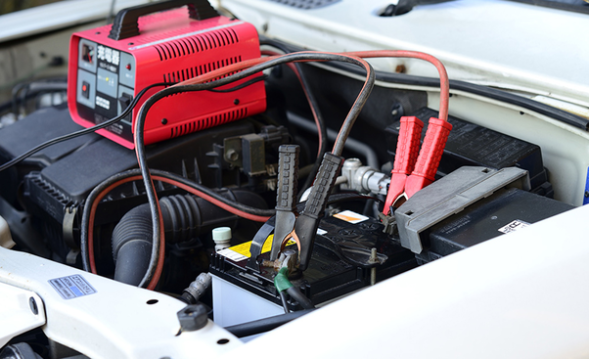Rev up Your Knowledge: Car Battery Recharging Tips!
Are you tired of constantly worrying about your car battery dying on you at the most inconvenient times? Well, worry no more! We’ve got the ultimate guide to help you keep your car battery in top shape and running smoothly. From understanding the basics of car battery recharging to learning the best practices for prolonging its lifespan, we’ve got you covered.

Image Source: quoracdn.net
First and foremost, it’s important to understand how your car battery works. A car battery is essentially a rechargeable device that stores electrical energy and provides the necessary power to start your car. When you turn the key in the ignition, the battery sends a surge of electricity to the starter motor, which then cranks the engine and gets your car running. However, over time, the battery’s energy can deplete, leading to a dead battery and a stalled car.
To prevent this from happening, it’s crucial to regularly recharge your car battery. But how long should you run your car to recharge the battery effectively? The answer may vary depending on the type of battery you have, the condition of your car, and how often you drive. However, there are some general tips and guidelines that can help you ensure your battery stays charged and ready to go.
One key tip is to avoid short trips that don’t allow your battery to fully recharge. When you take short trips, your car battery doesn’t have enough time to fully charge, leading to a gradual depletion of its energy over time. Instead, try to take longer drives or combine multiple errands into one trip to give your battery ample time to recharge.
Another important tip is to avoid overcharging your car battery. While it’s essential to recharge your battery regularly, leaving it connected to a charger for too long can actually damage the battery and shorten its lifespan. It’s best to follow the manufacturer’s recommendations for charging times and avoid leaving your car plugged in overnight or for extended periods of time.
Additionally, it’s important to keep your car battery clean and free of corrosion. Over time, dirt and debris can build up on the terminals of your battery, preventing it from properly charging. To prevent this, regularly clean the terminals with a mixture of baking soda and water, and make sure they are tightly connected to the cables.
In conclusion, keeping your car battery charged is essential for maintaining the overall health and longevity of your vehicle. By following these tips and guidelines, you can ensure that your car battery stays in top shape and ready to go whenever you need it. So rev up your knowledge and start implementing these car battery recharging tips today! Your car will thank you for it.
The Sweet Spot: Finding the Ideal Run Time for Your Car
Welcome to the ultimate guide on how long you should run your car to recharge the battery! When it comes to taking care of your vehicle, ensuring that the battery is properly charged is essential for a smooth and reliable ride. But how do you know the ideal run time to achieve the perfect balance without overdoing it? Let’s dive into the details and uncover the sweet spot for recharging your car battery.
First and foremost, it’s important to understand that the length of time needed to recharge your car battery can vary depending on a few key factors. These factors include the age of the battery, the condition of the alternator, and how often you drive your car. However, on average, running your car for about 30 minutes to an hour should be sufficient to recharge the battery fully.
If you’re using your car for short trips on a regular basis, you may find that your battery doesn’t have enough time to fully recharge between trips. In this case, it’s a good idea to take your car for a longer drive occasionally to give the battery ample time to recharge. Aim for a drive of at least 30 minutes to an hour to ensure that the battery is properly replenished.
On the other hand, if you’re someone who frequently takes long drives, you may not need to worry about the battery being fully charged all the time. The alternator in your car works to recharge the battery while you’re driving, so as long as you’re driving regularly, your battery should stay in good condition. However, if you notice that your battery is consistently low on charge, it may be time to take your car for a longer drive to give it a boost.
It’s also worth noting that certain Accessories in your car, such as the air conditioning or heating system, can put additional strain on the battery and affect the recharge time. If you find that your battery is taking longer to recharge than usual, try turning off these accessories while you’re driving to help speed up the process.
In addition to driving time, another important factor to consider when recharging your battery is the type of driving you’re doing. For example, stop-and-go city driving can be harder on your battery compared to highway driving, as the frequent stops and starts require more power from the battery. If you primarily drive in the city, you may need to take your car for a longer drive to ensure that the battery is fully charged.
Overall, finding the sweet spot for recharging your car battery is all about striking the right balance between driving time and the condition of your battery. By taking your car for regular drives of at least 30 minutes to an hour, you can help ensure that your battery stays in good condition and is ready to power your car when you need it. So, the next time you’re wondering how long you should run your car to recharge the battery, remember to aim for the sweet spot and enjoy a smooth and reliable ride!
Power Up Your Ride: Unveiling the Ultimate Guide!
Are you tired of constantly worrying about your Car battery dying on you? Do you find yourself constantly wondering how long you should run your car to ensure that the battery stays charged? Well, worry no more, because we’ve got the ultimate guide to help you power up your ride and keep your battery in top shape!
When it comes to recharging your car battery, there are a few key factors to keep in mind. The first and most important thing to consider is the type of battery your car uses. Different types of batteries require different charging methods, so it’s crucial to know what kind of battery you have before attempting to recharge it.
Once you’ve determined the type of battery in your car, the next step is to figure out how long you should run your car to recharge it. The ideal run time can vary depending on a variety of factors, including the age and condition of the battery, the weather conditions, and how often you drive your car.
In general, it’s recommended to run your car for at least 30 minutes to ensure that the battery gets a proper charge. However, this can vary depending on the specific circumstances. For example, if you’ve recently replaced your battery or if you drive your car frequently, you may be able to get away with running it for a shorter period of time.
On the other hand, if your battery is old or if you live in a cold climate, you may need to run your car for longer to ensure that the battery gets fully charged. It’s also important to keep in mind that running your car for too long can actually be detrimental to the battery, so it’s crucial to strike the right balance.
Another important factor to consider when recharging your car battery is the type of driving you do. If you primarily take short trips around town, you may not be giving your battery enough time to fully recharge. In this case, it’s a good idea to take your car out for a longer drive every once in a while to ensure that the battery gets a proper charge.
It’s also important to keep in mind that certain Accessories in your car can drain the battery faster, so it’s a good idea to limit their use when recharging the battery. This includes things like the radio, air conditioning, and headlights. By minimizing the use of these accessories, you can help ensure that your battery gets the charge it needs.
In addition to running your car for the right amount of time, there are a few other tips and tricks you can use to help keep your battery in top shape. For example, regularly checking the battery terminals for corrosion and cleaning them as needed can help ensure a strong connection and prevent any issues with charging.
Another good practice is to periodically check the water levels in your battery, if applicable. Keeping the water levels topped up can help ensure that the battery functions properly and stays charged. It’s also a good idea to keep an eye on the overall health of your battery and replace it when needed to prevent any issues down the line.
By following these tips and guidelines, you can ensure that your car battery stays charged and ready to go whenever you need it. So don’t let a dead battery ruin your day – power up your ride with the ultimate guide to recharging your car battery!
No More Guesswork: How Long is Too Long to Run Your Car?
Have you ever found yourself wondering how long you should run your car to recharge the battery? It’s a common question that many drivers have, and the answer can vary depending on several factors. In this article, we will delve into the topic and provide you with some guidance on how long is too long to run your car.
One of the most important factors to consider when determining how long you should run your car is the type of battery you have. Different types of batteries have different charging requirements, so it’s essential to know what kind of battery is in your vehicle. For example, traditional lead-acid batteries typically take longer to charge compared to newer lithium-ion batteries. If you’re unsure about the type of battery in your car, it’s best to consult your owner’s manual or a professional mechanic.
Another factor to consider is the age and condition of your battery. As batteries age, they may not hold a charge as well as they used to, which means they may require longer periods of running your car to fully recharge. Additionally, if your battery is in poor condition or has been drained completely, it may take longer to recharge compared to a healthy battery. In these cases, it’s crucial to monitor your battery’s voltage and charge level to ensure it is being properly recharged.
In general, most experts recommend running your car for at least 30 minutes to an hour to recharge the battery fully. However, this time frame can vary depending on the factors mentioned above. It’s always best to err on the side of caution and run your car for longer periods if you’re unsure about the battery’s condition or charging requirements.
It’s also essential to consider how you’re running your car while recharging the battery. For example, idling your car in place may not be as effective at recharging the battery compared to driving your vehicle at a steady speed. This is because driving at a consistent speed helps the alternator produce a more consistent charge for the battery. So, if you’re looking to recharge your battery efficiently, consider taking a short drive rather than idling your car in place.
Additionally, excessive idling can also put unnecessary strain on your engine and increase fuel consumption. So, it’s essential to strike a balance between recharging your battery and maintaining the health of your engine. If you find yourself needing to recharge your battery frequently, it may be a sign that there is an underlying issue with your battery or charging system that needs to be addressed by a professional.
In conclusion, when it comes to recharging your car battery, there is no one-size-fits-all answer. The length of time required to recharge your battery can vary depending on several factors, including the type of battery, its condition, and how you’re running your car. As a general rule of thumb, it’s best to run your car for at least 30 minutes to an hour to ensure the battery is fully recharged. However, if you have any concerns or questions about recharging your battery, don’t hesitate to reach out to a professional mechanic for guidance.
how long to run a car to recharge battery





